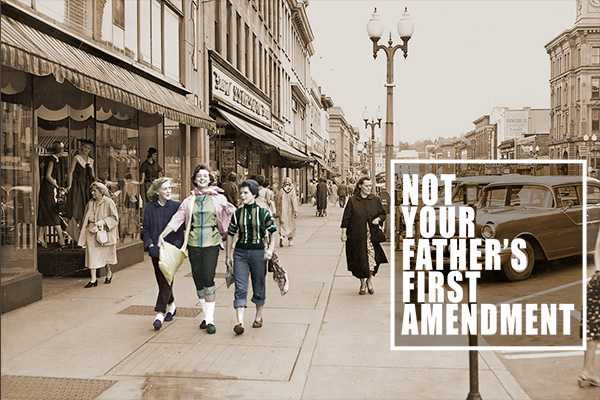Symposium: Not Your Father’s First Amendment

This daylong symposium brought together leading scholars and practitioners to explore the possibilities of an inclusive First Amendment for an era of advancing racial and gender equality, political polarization, and technological interconnectedness. Panelists addressed the following questions: Can the First Amendment transcend its origins and adapt to current conditions and dilemmas? Has the First Amendment become an obstacle? Or is the First Amendment good enough, despite the limitations of its original authors’ and mid-twentieth century interpreters’ viewpoints?
Keynote Speaker: Genevieve Lakier, Assistant Professor of Law, University of Chicago Law School
Professor Lakier is an expert in First Amendment law, whose writing explores the connections between culture and law. An Assistant Professor at the University of Chicago Law School, she recently published Imagining an Antisubordinating First Amendment in the Columbia Law Review, in which she explores the shift in the First Amendment’s political economy and how the modern formal approach of the Court tends to favor “the powerful and the propertied” over “the marginalized and the disenfranchised.”
Panel 1: The Freedom of Speech and the Equality of Citizenship
First Amendment doctrine, as it was developed in cases like Whitney v. California, was grounded on the belief that “discussion affords ordinarily adequate protection against the dissemination of noxious doctrine.” An array of new social movements including Black Lives Matter and #MeToo increasingly challenge that assumption, arguing that this faith underappreciates the significant harm and violence inflicted by hateful speakers and their speech. In doing so, like voices in the past, they and their fellow LGBTQ activists invite us to reimagine how the freedom of speech can be reconciled with constitutional commitments to equal citizenship.
Panel 2: The First Amendment and the Press in the Digital Age
The First Amendment’s answer to harmful or destructive speech has always been more speech, but is this premise sustainable? Nowhere is this tension more pronounced than in debates surrounding freedom of the press. As the media faces attacks from within and without, is it time to reconsider our faith in the marketplace of ideas?
Panel 3: Economic Progressivism and the First Amendment
The foundations of the modern First Amendment emerged during the height of American progressivism. Today, however, the Supreme Court increasingly insists on an irreconcilable tension between the rights of the First Amendment and the goals of progressive economic policies. What accounts for why the First Amendment did not seem at odds with government regulation to promote equality in the period of its formation?
- Tabatha Abu El-Haj, Associate Professor of Law, Thomas R. Kline School of Law
- David Pozen, Professor of Law, Columbia Law School
- Sophia Lee, Professor of Law and History, University of Pennsylvania Law School
Panel 4: The Digital Age, the First Amendment, and the Future of Democracy
With the advances of the digital age have come an array of new methods of speech control, often employed by private individuals and organizations. As we are increasingly confronted with the Janus-faced nature of the Internet as a mode for free expression and the risks of private tyranny, it is worth asking whether First Amendment doctrine has the capacity to respond to these challenges. And what is in store for our democracy if it does not?
- Kate Klonick, Assistant Professor of Law, St. John’s University School of Law
- Amanda Shanor, Assistant Professor of Legal Studies and Business Ethics, Wharton School at the University of Pennsylvania
- Chapin Cimino, Professor of Law, Thomas R. Kline School of Law
- Moderators: Matthew Schwartz and Michael Vuolo, Hosts of WAMU 88.5’s Unprecedented
Organizers